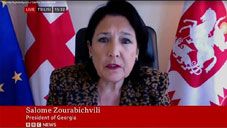
President Zourabichvili Questions Decision-Maker Behind Law Reintroduction: Georgia or Moscow?
By Liza Mchedlidze
Thursday, April 18, 2024
In a recent interview with the BBC, President of Georgia Salome Zourabichvili reiterated her criticism of the controversial Russian law, which she compared to legislation from Putin's Russia. She highlighted that this law not only undermines the work of NGOs and media but also targets international organizations that have been instrumental in supporting Georgia's state-building and economic development for over three decades. According to Zourabichvili, the funding mechanisms for these organizations are completely transparent, evidenced by detailed records available on their websites.
She expressed deep concerns about the non-transparent nature of government decision-making, particularly regarding the reintroduction of this law. Last year, massive public protests prevented the law's passage, yet its resurgence signals a troubling disregard for public sentiment, which Zourabichvili sees as a direct provocation to Georgian society.
Zourabichvili questioned the integrity of the decision-making process, speculating on the influence of external forces. She openly pondered whether the decision to reintroduce the law was made within Georgia's borders or if foreign influence, particularly from Moscow, played a role. This lack of clarity, she argued, points to potential corruption at the highest levels of government and raises significant transparency issues that need addressing to maintain public trust and democratic integrity.
"This is a matter of concern because it is a copy of Putin's law, which was passed in 2012 and then gradually tightened and developed. This law targets the activities of NGOs, the media, and those international organizations from our partner countries-European countries, the USA, or the United Kingdom-which have supported the independence of Georgia, the construction of state institutions, and the development of the economy for the last 30 years and more. It is a matter of concern; that is why the law was not passed last year as a result of mass demonstrations, and now the repetition of this law is a direct provocation of Georgian society.
Those international organizations that support Georgia have very strict rules when it comes to funding, so this is clear. There are websites where anyone can view these details. What is not transparent is corruption at the highest levels of government; what is not clear is how these steps were taken, especially this decision to reintroduce the law. Who decided to reintroduce the law? Did it happen in Georgia or outside its borders? Was this decision made in Moscow? These are the main questions about transparency," said Zourabichvili.

